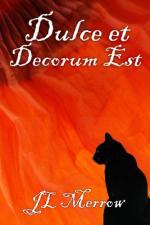|
This section contains 773 words (approx. 3 pages at 300 words per page) |

|
Dulce Et Decorum Est
Summary: This essay shows how Wilfred Owen tells the truth about the horrors of war through a combination of vivid imagery, rhythm and sound in his poem "Dulce Et Decorum Est".
Wilfred Owens's "Dulce Et Decorum Est" is a shocking poem about his experiences from World War One. Through the poem he tells the truth about war through a combination of vivid imagery, rhythm and sound.
Wilfred Owen, a great anti war poet, wrote this poem in 1917, as a response to Jessie Pope's pro-war poetry. Almost a hundred years later, his poem which was published after his death, still manages to shock us. In the poem he gives a blunt account of the horrors he witnessed as a soldier .He was sent home from the war with shellshock, and died a week before the war ended.
The first eight lines of the poem describe the weary men leaving the battlefield. Owen describes them as being "like old beggars under sacks" and "coughing like hags"; his unusual lexical choice makes the soldiers appear defeated. He uses connotations of dirt and...
|
This section contains 773 words (approx. 3 pages at 300 words per page) |

|


